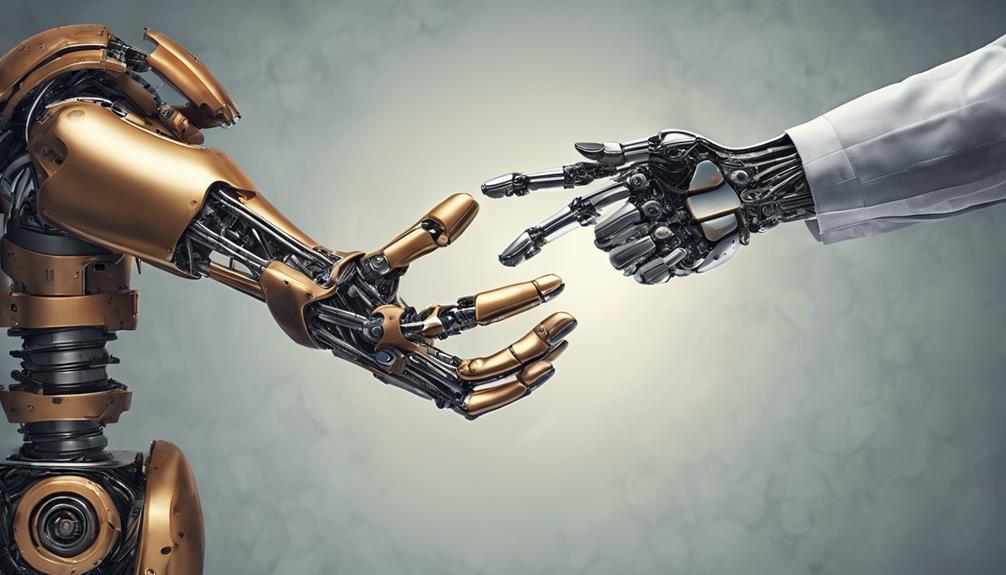In today’s rapidly changing job market, the integration of artificial intelligence is revolutionizing traditional roles and industries at an unprecedented pace. With AI advancing, job seekers are faced with the challenge of navigating this evolving landscape.
Understanding how AI is replacing jobs is crucial for anyone looking to secure their future career prospects. By exploring the intricate interplay between AI and employment, individuals can gain valuable insights that will not only aid in adapting to the changing job market but also in positioning themselves strategically for the opportunities that lie ahead.
Key Takeaways
- AI rapidly replacing jobs, impacting 85 million by 2025.
- Essential skills include data analysis, AI programming, and soft skills.
- Lifelong learning crucial for job resilience amid AI advancements.
- Job seekers must align upskilling with emerging AI demands.
Impact of AI on Job Market
Unquestionably, the rapid advancement of Artificial Intelligence (AI) is significantly reshaping the global job market landscape, with projections indicating the potential replacement of 85 million jobs by 2025. As AI tools become more sophisticated, the job market is witnessing a shift in the skills demanded from workers. Jobs in sectors like Customer Service are being transformed by AI, impacting the nature of roles and required competencies. AI's influence extends beyond basic automation, with Generative AI technologies capable of performing tasks that previously relied heavily on human input.
Workers need to adapt to this changing landscape by upskilling and acquiring new proficiencies that complement AI technologies. The demand for skills that are uniquely human, such as emotional intelligence, creativity, and critical thinking, is expected to rise as AI takes over routine tasks. Understanding the evolving job market and aligning skill development accordingly will be crucial for workers to remain competitive in an AI-integrated workforce. The interplay between AI and job roles underscores the necessity for continuous learning and adaptation in the modern labor market.
Jobs Being Replaced by AI

The impact of Artificial Intelligence (AI) on the job market is evidenced by the looming replacement of 85 million positions globally by 2025, encompassing roles such as customer service representatives, drivers, programmers, analysts, and paralegals.
- Automation and chatbots are increasingly handling inquiries, leading to the replacement of customer service representatives.
- Autonomous vehicles are reducing the need for human drivers, impacting the job security of car and truck drivers.
- Generative AI tools like ChatGPT have the potential to automate coding tasks, putting computer programmers at risk of being replaced by AI.
- The use of AI in legal research and documentation is making some paralegal roles less likely to be in demand, as tasks traditionally done by humans are being lost to AI systems.
As AI continues to advance, it is expected that more jobs will be susceptible to automation, highlighting the need for individuals to adapt and acquire skills that are less likely to be replaced by AI in the future.
Skills for AI-Resilient Careers
Developing proficiency in data analysis, machine learning, and AI programming is crucial for building resilient careers in the face of AI automation. Alongside technical skills, soft skills such as creativity, critical thinking, and emotional intelligence are becoming increasingly important in roles less susceptible to AI algorithms. Adapting to market trends and continuously upskilling to stay abreast of emerging technologies can help future-proof careers against job displacement caused by AI advancements. Specializing in interdisciplinary fields like AI ethics, cybersecurity, and data privacy presents unique career opportunities in the AI-resilient job market. Moreover, mastering human-centered skills and learning to effectively collaborate with AI systems are essential strategies to enhance job security in the evolving workforce impacted by AI.
| Skills Needed | Market Trends | Career Opportunities |
|---|---|---|
| Data Analysis | AI automation | AI Ethics |
| Machine Learning | Emerging technologies | Cybersecurity |
| AI Programming | Interdisciplinary fields | Data Privacy |
Strategies for Job Seekers

To navigate the evolving job market influenced by AI, job seekers must strategically align their upskilling efforts with the demands of emerging technologies and the increasing importance of soft skills. As companies currently predict significant job loss due to AI implementation, job seekers need to adapt by developing key strategies:
- Continuous Upskilling: Job seekers should engage in lifelong learning to acquire new skills that align with the evolving demands of AI-integrated roles.
- Focus on Soft Skills: Developing essential soft skills like critical thinking, creativity, and adaptability can make job seekers more valuable in roles where AI complements human abilities.
- Stay Informed: Keeping abreast of AI capabilities and trends is essential to anticipate changes in the job market and position oneself effectively.
- Understand Job Role Transformations: Recognizing how AI impacts different job roles enables job seekers to proactively prepare for potential shifts in their industry and function.
Future Job Trends Amid AI
Amid the rapid advancements in artificial intelligence (AI), the landscape of future job trends is undergoing significant transformation. AI development is creating new jobs while also posing a threat of job obsolescence in various industries.
Job automation driven by AI systems is reshaping the job market, with predictions suggesting that millions of jobs are at risk of being replaced by AI by 2030. Legal occupations, science researchers, and administrative roles are among those facing high risks of job obsolescence due to AI advancements. According to Forrester, 2.4 million jobs in the US could be replaced by AI in the next decade.
Moreover, Goldman Sachs forecasts that jobs with salaries exceeding $90,000 are most vulnerable to automation, indicating the diverse impact of AI on different income brackets. Job seekers need to stay informed about future job trends amid AI to adapt to the evolving job market and identify new opportunities arising from technological advancements.
Frequently Asked Questions
What Are the Jobs That AI Will Replace?
AI is poised to replace roles in customer service, transportation, coding, research analysis, and paralegal work. Automation and efficiency gains from AI technologies are reshaping industries, prompting workers to adapt their skills and embrace new opportunities for career growth.
How Will AI Replace Workers?
AI will replace workers through automation, chatbots, and advanced technologies like generative AI tools. Industries such as customer service, transportation, programming, research, and legal services are experiencing shifts as AI technology evolves to perform tasks traditionally done by humans.
How AI Is a Threat to Employment?
AI poses a threat to employment due to its ability to automate tasks, reducing the need for human workers in roles involving repetitive or data-driven tasks. The impact is significant across various industries, reshaping employment landscapes.
What Jobs Will Be Gone by 2030?
By 2030, it is projected that occupations in legal, science research, and administrative sectors could witness significant job losses due to automation. High-income jobs, particularly those exceeding $90,000, face increased vulnerability to AI displacements.
Conclusion
In conclusion, as artificial intelligence continues to reshape the job market, job seekers must adapt by developing AI-resilient skills and staying agile in acquiring new competencies.
Like a sailor navigating through turbulent waters, individuals must steer their career paths with foresight and flexibility to remain competitive in the evolving landscape influenced by AI.
Embracing lifelong learning and embracing the opportunities AI brings can lead to new horizons and possibilities in the workforce.








